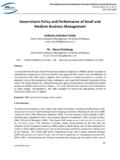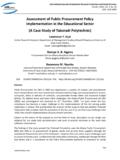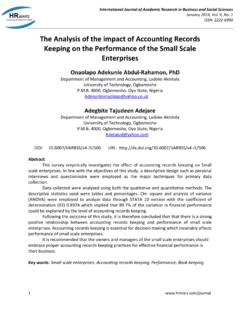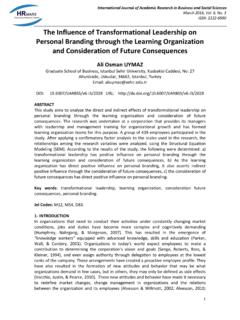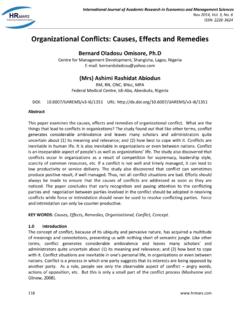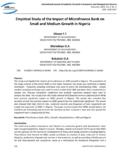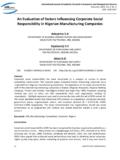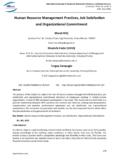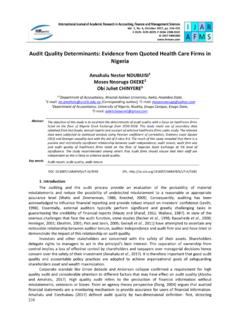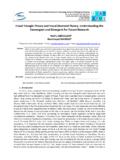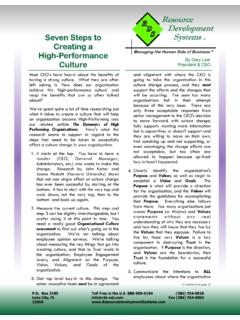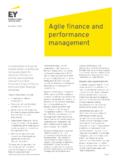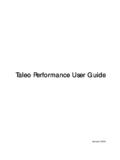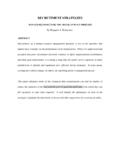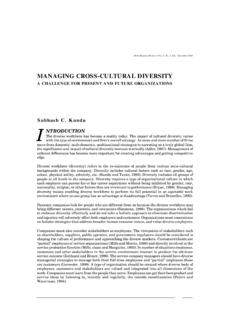Transcription of Effects of Talent Management on Employees …
1 International Journal of Academic Research in Economics and Management Sciences Sep 2014, Vol. 3, No. 5 ISSN: 2226-3624 114 Effects of Talent Management on Employees retention : The Mediate Effect of Organizational Trust Ali Chitsaz-Isfahani Department of Management , Faculty of Administrative Sciences and Economics, University of Isfahan, Isfahan, Iran Email: HamidReza Boustani Department of Management , University of Isfahan, Iran Email: DOI: URL: Abstract Talent Management is found to be important for modern organizations because of the advent of the Modern economy, new generations entering the human resource and the need for businesses to become more strategic and competitive, which implies new ways of managing resource and human capital.
2 In this research, the relationship between Talent Management , employee retention and organizational trust is investigated. The aim of the article is to examine the effect of Talent Management on employee retention through organizational trust among staffs of Isfahan University in Iran. The research method is a descriptive survey. The statistical population consists of staffs of Isfahan University in Iran. The sample included 280 Employees , which were selected randomly. Data have been collected by a researcher-developed questionnaire and sampling has been done through census and analyzed using SPSS and AMOS software.
3 The validity of the instrument was achieved through content validity and the reliability through Cronbach Alpha. The results of hypothesis testing indicate that there is a significant relationship between Talent Management , employee retention and organizational trust. The study is significant in that it draws attention to the Effects of Talent Management on organizational trust and Employees retention in organization. Key words: Talent Management , organizational trust, Employees retention 1. Introduction We are living in an age where technological advances are fast and, consequently, technological, cultural, social, and political changes are inevitable.
4 Attracting talented Employees to the business, maintaining them and satisfaction their loyalty to the business, availability of education and career development opportunities, career Management , Succession Planning and service of coaching by the managers to their staffs are considered as important points. The staffs now prefer business environments in which they will develop, renovate themselves, learn International Journal of Academic Research in Economics and Management Sciences Sep 2014, Vol. 3, No. 5 ISSN: 2226-3624 115 continuously and in which their ideas are supported and encouraged.
5 Talent Management has become a main issue in the Public and private organizations and business administration field from the end of the Nineties and As a new stage Talent Management is becoming a way of applying human resource Management functions in the organizations. The labor market has entered a new era as a result of innovation, knowledge development, globalization and increased competition (Sheehan, 2012). On the other, The costs of recruiting Employees , and low retention of experted Employees , are major expenses for any organization. The success of organizations depends on employee retention which helps the organization in reducing Employees turnover intention and enhancing organizational efficiency (mohsen, 2007).
6 So, organizations pay more attention on retention and attraction rather than recruitments and selection to survive in competitive environment (Holland et al, 2007) and Talent Management plays an important role in this process. In Sweden country, a survey called the Talent Management Barometer conducted by Tidskriften Personal & Ledarskap, Sveriges human resource F rening & Stardust Consulting in 2012 on a set of respondents comprised of 40 % human resource managers, 30 % human resource professionals and 30 % line managers, revealed that very few (16 %) are pleased with their present Talent Management , and agree that more resources need to be placed on this in the future.
7 Furthermore, only 24 % answered that they have a Talent Management strategy which connects basic human resource processes such as recruitment, on-boarding and performance evaluation. Over half of the respondents agree that Talent Management is one of the most important issues today, while 81 % think it will be a growing concern in the future. At the same time, only 33 % believe that their organization has come to an agreement on what Talent Management is, and only 23 % have a clear definition of Talent in their organization. This leads to the conclusion that even though companies are aware of Talent Management and value it, the first steps in adopting Talent Management have been taken by very few companies, and furthermore, there are few companies that have a holistic point of view on Talent Management (Yllner , 2013: 2) Despite a lot of academic work from several researchers, more exploration is needed to understand the Effects of Talent Management on employee retention .
8 Thus, The purpose of this research is to empirically investigate the impact of Talent Management on the retention of employee through organizational trust among staffs of Isfahan university in Iran. 2. Literature Review Concept of Talent Management : Some Conceptions How organizational Talent in defined for Talent Management purposes is a complex issue, with no consensus in practice as to what such Talent is (Tansley et al., 2007). Some argue that companies do not even know how to define Talent , let alone how to manage it (The Economist, 2006, p. 4). Talent Management is one of the most important factors in ensuring sustainable organizational success (McDonnell 2011, p.)
9 169). According to Hartley (2004), Talent Management is a term that extends over a wide set of activities, such as succession planning, Employees loyalty, Employees trust, human resource planning, employee performance Management etc. Talent Management is defined as a systematic and dynamic International Journal of Academic Research in Economics and Management Sciences Sep 2014, Vol. 3, No. 5 ISSN: 2226-3624 116 process of discovering, developing and sustaining Talent . Schweyer (2004) argues that a very essential part of the TM strategy is to retain and develop the Talent individuals.
10 Table1: The three main streams in Talent Management Talent Management Perspectives Definition 1 Talent Management as Human Resource Talent Management to be associated with typical human resource practices such as recruiting, selection, training, development, and career and succession Management (Heinen & O Neill, 2004). 2 Talent Management Focused on the Concept of Talent Pool the source of success for leaders and companies consists in the creation of a pool of skilled and motivated people that enables in the long run a phenomenon of recruitment of external talents and a process of knowledge s development for the Employees that are already in the company (Pascal, 2004).
